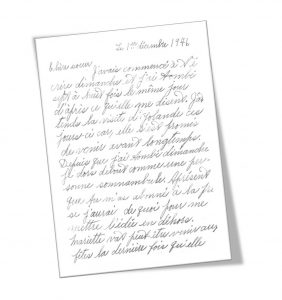Marguerite-Marie
By Marie-Claude Thifault, University of Ottawa

The Saint-Jean-de-Dieu Hospital, located at the east end of Montreal, was central to the life of Margeurite-Marie. Founded in 1873 by the Sisters of Providence, Saint-Jean-de-Dieu Hospital was an important Quebec mental health institution, housing people considered idiots, imbeciles, maniacs and epileptics.
Fatherless at age 12, Marguerite-Marie was interned at the Hospital Saint-Jean-de-Dieu due to her epilepsy. She remained a patient for the rest of her life. Marguerite-Marie’s patient records are typical of thousands of others in the archives during this period. Twenty-nine years of her life are recorded in only thirty pages. Her life indicated that upon admission Marguerite-Marie made a favourable impression on the institution’s psychiatrists. On October 15th 1921, she is recorded as responding with intelligence and insight to questions posed by the institution’s psychiatric staff.

In the past, mental health patients were institutionalized for indeterminate and often lengthy periods, so their lived experiences differed greatly from patients in general hospitals. This exhibit argues that even in the period before deinstitutionalization, the outside world was very much a part of the life of Marguerite-Marie, though the activities she did and her continued connections with her family. In accordance with the principles of moral treatment practiced at the institution, Saint-Jean-de-Dieu patients deemed not to be dangerous, could attend theatrical, musical or literary performances. These social activities promoted exchanges between female and male patients. Despite these social interactions, the lived reality of life in an institution was frequently fraught with difficulty.
Her institutional file reveals little about the daily experiences of Marguerite-Marie and her transition from girlhood to womanhood. However, we do know that on October 6, 1926 it was recorded that she had experienced no seizures for two years and she was deemed to have no mental or emotional aberrations. This observation was followed up with the recommendation, “It does not seem necessary to extend her stay.” Although Marguerite-Marie stayed with her family in 1924 on a temporary leave, she returned to Saint-Jean-de-Dieu and remained there until her death.
We can only assume that the constant care of Marguerite-Marie, who was prone to epileptic episodes, was too much of a burden on her mother. Medical notes reveal that as a young adult her epileptic seizures increased and she grew increasingly irritable, angry and even violent. During the 1940s, her medical records focus primarily on bouts of pneumonia, and by the time she turned 40 her epileptic episodes occurred weekly. Despite her declining health the records indicate that Marguerite-Marie, “reads, works, and occupies herself.” In addition, we have found samples of her embroidery and other handiwork.
A number of Marguerite-Marie’s letters, addressed to her mother and her sister Cécile, are housed in the family archives. These letters indicate that familial ties were maintained during her institutionalization. Her correspondence with her family informs us that she was visited regularly by her mother, four sisters and some of her aunts whom she welcomed, according to her letters, with courage, patience and hope. Her letters also tell us about her daily life including her tastes, desires and dreams. We learn that she passed the time playing card games, such as Bridge or Five Hundred, as well as crossword puzzles, reading and writing.

Despite the difficult realities of a lengthy institutionalization, Marguerite-Marie gained pleasure in reading the newspaper La Presse. She wrote to her sister Cécile, “Since you gave me a subscription to La Presse, I have the means to leave [the asylum] in my thoughts.” Immersing herself in the newspaper allowed Marguerite-Marie to escape, temporarily, the feelings of being institutionalized, keeping her connected to the social and political world outside the institution’s walls.
